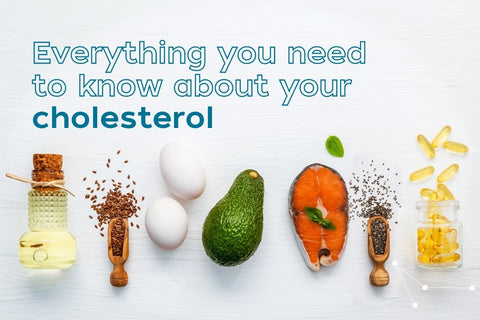What is cholesterol?
Cholesterol is a type of fat that is ingested when we eat, and can be measured in our blood. High levels of blood cholesterol are associated with an increased risk of cardiovascular disease, raising the risk of heart attack and stroke.
High levels of 'bad cholesterol' can build up in the walls of arteries, causing impaired blood flow and inflammation that can result in the formation of blood clots that can suddenly obstruct blood supply to the heart and brain.
Not all cholesterol is bad cholesterol
There are different types of cholesterol, some good, some bad.
'Bad cholesterol' refers to Low-Density Lipoprotein (LDL) which builds up in the arteries.
'Good cholesterol' refers to High-Density Lipoprotein (HDL) which helps to remove LDL, transporting it back to the liver for disposal.
Total cholesterol refers to the total level of HDL and LDL. Doctors will often use the ratio of total cholesterol to HDL to determine the cholesterol:HDL ratio which is used to estimate overall cardiovascular risk. A higher level of good cholesterol and lower total cholesterol results in a lower risk of heart disease and stroke.
And finally, while not technically a type of cholesterol, triglycerides are also considered to be unhealthy fats, high levels of which can also increase cardiovascular risk.
5 tips to improve your cholesterol
1. Aim to reduce belly fat and maintain a healthy weight
The only sure way to lose weight is to generate a 'calorie-deficit' by balancing a calorie-restricted diet with healthy levels of exercise. For those already in the healthy weight range, a focus on weight maintenance and avoidance of weight gain is important.
2. Boost good cholesterol by eating fish 2-3 days per week
Fish (especially oily fish like mackerel, salmon, and sardines) is a rich source of Omega-3 fatty acids including DHA and EPA. These compounds are associated with lower rates of cardiovascular disease and might help lower levels of bad fats. The Heart Foundation of Australia recommends a heart-healthy diet containing 2-3 serves of fish per week.
3. If you don't eat fish, consider a supplement containing Omega-3
For those who prefer to avoid animal products, some supplements derived from algae contain healthy levels of omega-3.
4. Decrease your intake of animal fats, especially red meat and butter.
Fats derived from animal foods other than fish typically contain higher levels of saturated fat which tends to raise LDL levels.
5. Increase fruit and vegetable intake.
Plant-based foods are naturally low in bad fats and rich in fibre which supports our gut microbiome and promotes healthy metabolism and weight loss.
References:
1. Cholesterol. Available from: https://www.healthdirect.gov.au/what-is-cholesterol
2. Fish and omega-3: Questions and answers. Heart Foundation Australia. Available from: https://www.heartfoundation.org.au/getmedia/4adbe011-db9a-4777-8a99-db6365e27cb1/Consumer_QA_Fish_Omega3_Cardiovascular_Health.pdf
3. Nestel et al. 2015. Indications for Omega-3 Long Chain Polyunsaturated Fatty Acid in the Prevention and Treatment of Cardiovascular Disease. Heart, lung and circulation. Available from: https://www.heartlungcirc.org/article/S1443-9506(15)00167-5/fulltext


